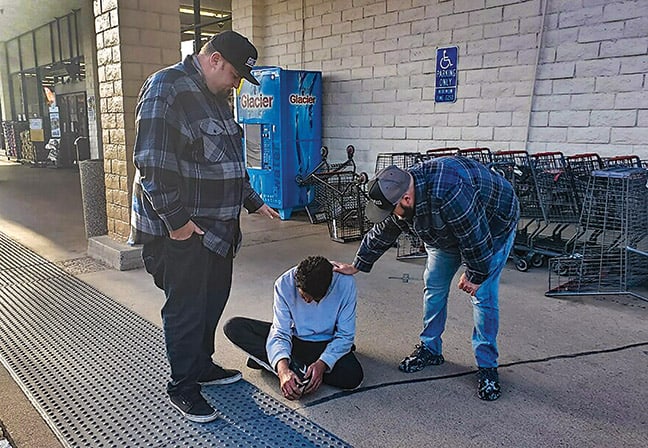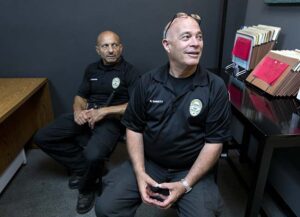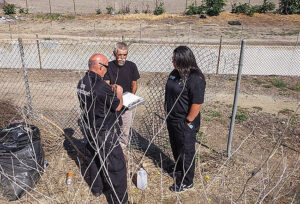Changing lives, odds be damned, Part III of III: good cop/good cop

Pastor Robert Edwards (left), who collaborates with Montclair’s Homeless Outreach and Enforcement Unit, and an assistant talking recently to one of the city’s chronically unhoused persons. Photo/courtesy of Gabriel Fondario
by Mick Rhodes | editor@claremont-courier.com
Part III of III: good cop/good cop
How do they do it?
By their own admission, Gabe Fondario and Robert Hargett’s success rate is in the single digits. So how do the duo, who make up the City of Montclair’s Homeless Outreach and Enforcement Unit, keep from becoming jaded in the face of that grim statistic?
“I hope I never do get like that,” Fondario said. “And if I do, I hope somebody points it out to me, because then I don’t belong in this position anymore. Because you have to have that out here.”
Hargett’s father was a police officer. Part of his job was arresting bad guys, but he also helped out those in need.
“I was raised in a Christian household,” Hargett said. “We were made to help individuals who were down on their luck. Going to school, there were people there I grew up with, and you’re always helping each other out. Fast forward in life, I got involved with a church group and we used to go down on mission trips to Mexico. I helped build some houses and churches down there. That kind of set me on my path to helping the people that need the help.”

Montclair Homeless Outreach and Enforcement Unit officers Gabriel Fondario, left, and Robert Hargett. COURIER photo/Steven Felschundneff
His partner’s journey was quite different.
Fondario’s mother was in and out of mental institutions when he was a youngster, and had numerous suicide attempts.
“I had seen some pretty ugly stuff, and witnessed some things that she had done, such as trying to take her own life, and just how chaotic it was in the household,” he said. “And I guess I could have gone either way. I could have went down a path that was similar to that, or I could use those things to try to help other people.”
Understandably, he resented his mother when he was young. Now 59, he’s learned more about mental illness over time — with a real crash course since taking his new job in 2016 — and has arrived at a place of forgiveness.
His upbringing “helped me develop a pretty good understanding [of mental illness],” Fondario said. “And it also helped me to be able to walk into different situations and basically not freak out about what I’m seeing and what I’m dealing with, because I’ve seen a lot growing up in my own household. So I think it helped mold me into who I am today, and for having that empathy with other people. It definitely helped me in my duties that I have right now, for sure.”
Fondario and Hargett operate much like partners in a buddy cop move. Their names even sound like the title of a buddy cop movie.
Hargett is cast as the tough, no-nonsense type, making sure protocols are followed. He’s on his laptop in seconds when a need arises, working quickly, as time can be the enemy after a client decides to accept their help. Many people, he told me, will backpedal if a placement can’t be made right away.
Fondario, shorter and heavily muscled, is the face of the operation. He’s naturally gregarious, and looks everyone in the eye. He reads a room well and is ever mindful of the tone of the moment. He’s quick to hug or fist bump, depending on the situation.

Homeless Outreach and Enforcement Unit officer Robert Hargett (left) and chaplain Dianna Delgado offering resources recently to an unhoused man along the San Antonio Flood Control Channel in Montclair. Photo/courtesy of Gabriel Fondario
It’s an efficient partnership that covers every aspect — technical, procedural, emotional, and legal — of trying to find placement for the “wounded walkers” among us. It’s a dynamic duo to be sure: a dynamically effective one.
The COURIER watched them in action on September 12, when they, with help from their frequent collaborators chaplain Dianna Delgado and pastors Donald and Ethel Rucker, worked to help a 70-something woman who, per her request, we will call “Jane” to protect her identity.
The mother of four told us her ex-husband, a cop, beat her regularly. He eventually landed in the California Institution for Men in Chino after a theft conviction. Since then she’s lived on her own, but recently with family. That situation soured, and she found herself out of options, possibly facing life on the streets.
“I’m not a child,” Jane said. “I’m an adult. I’ve always taken care of myself, but this is one time where I need help.”
The night prior Fondario and Hargett rented her a room at the Welcome Inn Motel, on Mission Blvd. in Montclair, and bought her some clothes, toiletries, and food.
Early the next morning the talk was centered on vetting a family friend in Florida who had agreed to take her in. Fondario interviewed the woman at length. Background checks were made.
Pastor Delgado heard Jane’s testimony and offered firsthand advice from her own personal and family struggles. After about an hour of heightened emotions and precision planning, Jane was on a new path, the Ruckers had donated a suitcase, and a Fondario and Hargett had purchased a one-way airline ticket for her to Tampa Bay, Florida.
Two hours later, Jane was in the air. It was a rare victory for Fondario and Hargett.
“This is a home run,” Hargett said. “Actually, a grand slam.”
It’s clear their work is more than a job. But the problem they’re addressing is nonstop and their “clients” seemingly endless. Many are suffering some sort of medical or psychiatric crisis, some more acutely than others. And, as we learned in Part II of this series, most of the folks they’re trying to help just aren’t ready.
“Right now, 99 percent of the people we run into, we have places for them to go,” Hargett said. “Unfortunately, they have to want to go.”’ That willingness to accept help is a constant concern.
Most of the unhoused folks they help end up in Southern California rehab facilities or temporary housing. Some are hospitalized. Jane’s case, with an out-of-state benefactor willing to take her in, was extremely rare.
“The ones that do want help, we get them into the places and get them on the straight and narrow,” Hargett added. “Sometimes they’ll fall off, just like an alcoholic will fall off the wagon, and you just need to pick them back up and get them into another place where they might fit better.”
Their budget is ever-changing. Three years ago it was less than $1,000 and laden with red tape, requiring written permission from the city before the team could access funds. But, Hargett said, Montclair “stepped up.” Their budget in 2022-23 is $10,000. And with six years of results behind them, the pair has earned the trust of the city and the freedom to tap into funds to make things happen quickly.
“Our city council, our city manager, and city staff here realize that homelessness is not going away,” Hargett said. “A lot of people say we can end homelessness by a certain year, but it’ll never go away. The individuals are out there.”
They’re in a constant search for county, state and federal grants. Some have strict requirements that sometimes do not mesh with the realities of chronically unhoused people. As a result, grant money can sometime go unused. It’s a roadblock that rankles Fondario.
“There is no treatment attached to any type of housing with those grants,” he said. “And you have to be very careful about faith-based organizations being involved and trying to implement — I’m not going to say their beliefs — but they’re Christian programs, and they’re very effective.”
Though the funding arm of the program may be imperfect, the efforts of Montclair’s Homeless Outreach and Enforcement Team have had real world implications for many.
The young man we talked to in Part I of this story, 18-year-old Joshua Duncan, who spent four years addicted to meth before Fondario and Hargett helped him get back to his family in Arizona, may just be their crowning achievement thus far. It’s early, but Duncan is clean, safe, and sober.
We asked him if he thought he could continue stay away from meth.
“Yeah, I think I can do it,” Duncan said. “I have no [desire] towards it. I don’t want to do that anymore. That was a learning lesson all itself.”
Duncan is working now and studying for his high school equivalency test. Long term plans may include joining the air force or starting his own business.
In other words, he dreams the dreams of an average 18-year-old American.
But for Fondario and Hargett, one wonders if Duncan would be having those dreams right now.
“The only thing that I’ve really got to say is that they’re really good people,” Duncan said. “They took really valuable time out of their day to bring me to where I needed to be. And I was just this one person. And they did it.”
Parts I and II of this series, “a case study,” and “’the warzone,’” are available at claremont-courier.com.









0 Comments